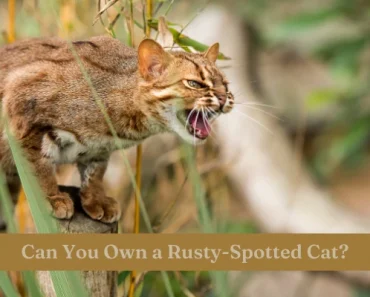Having a caracal as a pet could be a great alternative to the bigger cat species.
These exotic animals are medium-sized and more catlike than many of the others in appearance and characteristics.
Caracals are beautiful animals that would make a great addition to your family if you are looking for an exotic cat.
But can you have a pet caracal? Is it legal in the U.S.? In the U.K. and elsewhere? I’ll cover all the details now.
Can You Have a Caracal as a Pet?
Yes, you can have a caracal as a pet in many different areas of the world. Caracals are legal in many states where other bigger cats aren’t, such as leopards and jaguars.
Some areas will require additional paperwork and permits before allowing you to have a pet caracal though.
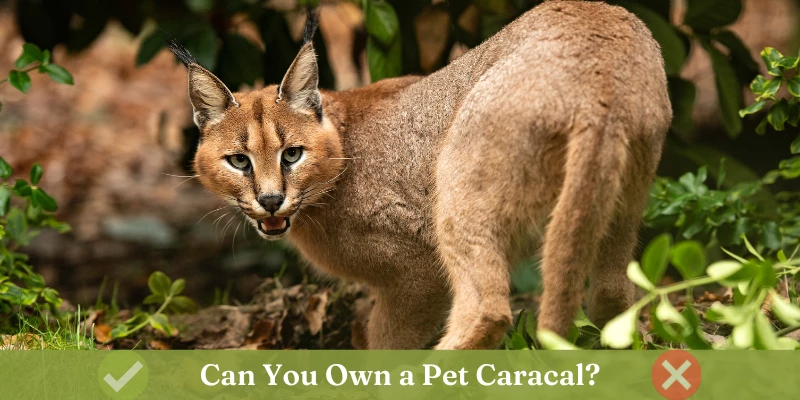
Can You Have a Pet Caracal in the United States (U.S.)?
Yes, you can have a caracal as a pet in the United States. Pet caracals are legal to own with a valid possession permit in many different states within the United States.
Caracals are legal as exotic pets in Arizona, Arkansas, Delaware, Florida, Indiana, Maine, Mississippi, Missouri, Montana, North & South Dakota, Oklahoma, Pennsylvania, and Texas.
Can You Own a Caracal as a Pet in Canada?
The simple answer to this question is yes, you can have a caracal as a pet in Canada. The not-so-simple answer is that it depends on what territory or province in which you reside.
Each province will have its own exotic pet laws in regard to owning exotic animals as pets.
The best advice I can give to you is to find contact information for your local wildlife officials and get the answers for owning a pet caracal directly from the officials so there is no doubt.
You can visit here to find fish and wildlife contact info if you live in Alberta.
Can You Keep a Caracal as a Pet in Australia?
No, it is illegal to own a caracal as a pet in Australia, per the Australian Government. Australia’s exotic pet law states that only cats, dogs, rabbits, horses, and select species of birds from approved countries are allowed to be imported into Australia as pets.
All other animals, exotic or not, are restricted and are only allowed into Australia for the purpose of education and zoology.
If you would like to read more about Australia’s exotic pet laws, you can visit here.
Can You Have a Pet Caracal in The United Kingdom (UK)?
Yes, it is possible to legally own a caracal as a pet in the United Kingdom, but you will be required to have a Dangerous Wild Animal license to keep a pet caracal in a private setting.
For approval, UK officials will look at many different factors, including your living arrangements and any experience you may already have with handling exotic cats.
Some people will get approved to have a pet caracal while others will not. I can’t say either way because I don’t know your circumstances.
However, you can contact your local officials who will be able to provide factual information on what you need to do to have a caracal as a pet in the UK.
Are Caracals Good Pets?
Caracals are good pets for experienced pet owners who know how to handle exotic cats. To be successful at keeping a caracal as a pet, you need experience, training, and the necessary permits.
If you know how to handle a caracal or similar exotic cat, then they can make good pets.
Let’s dive into the details about pet caracals to give you a better understanding of who these cats are and what it will take to own one as a pet.
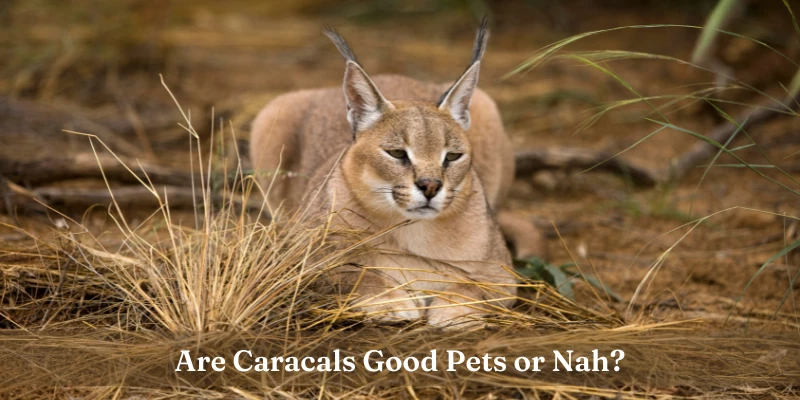
5 Reasons Caracals ARE Good Pets
Below are 5 reasons that caracals are good pets.
1. Pet Caracals Can Bond
Caracals can be awesome animals to have as pets if you or the right person has the necessary experience and training to house one of these beautiful cats!
These cats can grow a special bond with their handler and will express their love.
2. Pet Caracals Are Cool
I know this isn’t a valid reason in the decision-making process of getting an exotic animal as a pet, but caracals are really cool-looking creatures.
I love their pointy ears and their (not too big, not too small) size!
3. Pet Caracals Are Friendly
Domesticated pet caracals are friendly animals with whom they have that special bond. They can seem like regular house cats at times if they’ve been held properly starting at a young age.
They can grow up and be almost as domestic as any other pet (with the proper handling).
4. Pet Caracals Are Active
Due to their wide habitat range and physical abilities, pet caracals can be labeled as active animals.
This can be a good thing if you don’t want a pet that is just going to lay around all day.
5. Pet Caracals Live Long
If you are looking for an animal with a longer lifespan, then a pet caracal could be the right pet for you.
Caracals live an average of 16 to 18 years in captivity, but some have reportedly lived for up to 20 years.
5 Reasons Caracals ARE NOT Good Pets
Below are 5 reasons that caracals are not good pets.
1. Caracals Are Territorial
Caracals are territorial animals that mainly live alone or in groups of two.
Territorial animals can have a hard time breaking habits like marking their territory with urine or scratching up objects.
2. Caracals Can Be Dangerous
Caracals certainly can be dangerous in the wild. They don’t usually attack humans but have been known to prey on smaller animals, including domestic pets and livestock.
This could pose a problem if your pet caracal isn’t properly domesticated.
3. Caracals Are Not Domestic Cats
Caracals are cats but they are not your typical domestic household cat. They have different needs and you have to treat them differently when owning one as a pet.
You have to be mindful of things like neighbors, living arrangements, and budget – which will require much more attention than a regular house cat.
4. Caracal Diet
Pet caracals require a special diet primarily consisting of meat. In the wild, they eat anything from birds to antelopes to rodents.
They eat whatever they catch whenever they catch it.
They aren’t that picky as long as there is meat on the bones. While not a major factor, you will need to budget a little more for food.
5. Caracal Space
Pet caracals need a wide range of land for their habitat to stay active and healthy – and still be able to roam and feel wild, to a certain extent.
If you keep one cooped up in the house all day, it’s likely it will get depressed at some point and start behaving differently.
Caracal Physical Description
A caracal is a medium-sized cat with a slim build that sports close to 1-inch canine teeth, a short face, and long legs. Caracals are mostly tan or reddish-brown in color with white undersides.
They have large, pointy, and tufted ears with black tips that they use to swivel around for better hearing.
Caracal Height
Caracals have a height ranging between 15 to 22 inches at the shoulder.
Caracal Length
Caracals can grow from 35 to 50 inches in length, which includes their 8 to 12-inch tails.
Caracal Weight
Caracals can weigh between 20 (9 kg) to 40 (18 kg) pounds. Females will be slightly smaller than males.
Caracal Speed
Caracals can run in bursts of speed up to 50 mph (80 kmph). They can easily outrun their prey, including rodents and antelopes.
Caracal Leaping Ability
Caracals can leap up to 10 feet in the air. They have strong hind legs that help them jump to catch birds and navigate trees.
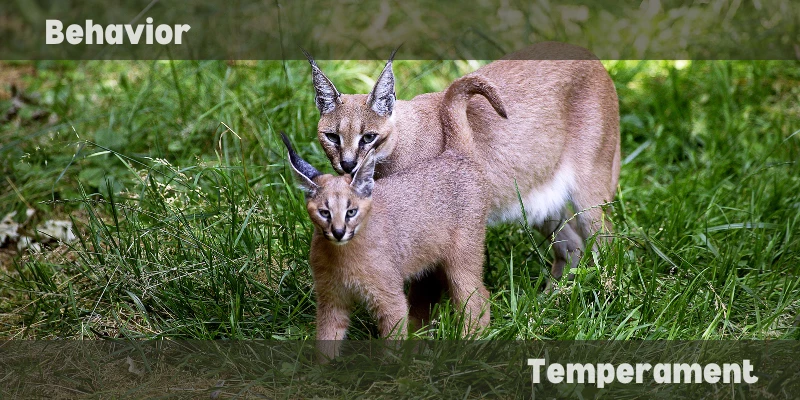
Caracal Behavior & Temperament
Below are some common questions and answers about caracal behavior and temperament.
Are Caracals Aggressive?
Caracals aren’t known to attack humans under normal circumstances. They prefer flight over fight when it comes to human interaction in the wild.
Caracals have been known to kill cats and livestock, but that is in relation to wild caracals and not ones that have been trained and “domesticated”.
Are Caracals Dangerous?
Caracals can be dangerous if proper steps are not put in place to ensure everyone’s safety and the safety of the animal as well.
While caracals aren’t known to routinely attack humans in the wild, they are still wild animals if not trained and bred to be part of a domestic environment.
Are Caracals Affectionate?
Pet caracals can be affectionate and grow a special bond with their handler if handled from an early age.
As with any animal that is naturally wild, it takes the proper experience to train these animals in a domestic setting.
Yes, they can be loving and affectionate, but each pet caracal has a different personality.
Are Caracals Solitary?
In the wild, caracals are solitary animals but may be spotted in pairs of mates at times.
They mark their territories with their urine and will defend their territories when necessary.
Are Caracals Docile?
Caracals are not docile animals. You can’t act the same way around a pet caracal as you would a typical house cat.
If you want to be affectionate with your caracal, allow your pet to initiate contact.
What do Caracals Eat?
In the wild, caracals prey on birds, rodents, antelopes, rabbits, chickens, and any other smaller animal they can catch.
If you owned a caracal as a pet, the main part of your pet’s diet would be meat, preferably fresh – not frozen.
Caracal Habitat
A wild caracal has a territory range spanning several miles. They can live in a number of different habitats including forests, savannahs, and woodlands.
They are territorial animals that will defend their territory from other caracals that enter it.
Having a pet caracal would require proper accommodations for your caracal’s habitat to allow it enough open space to keep a healthy mind and body.
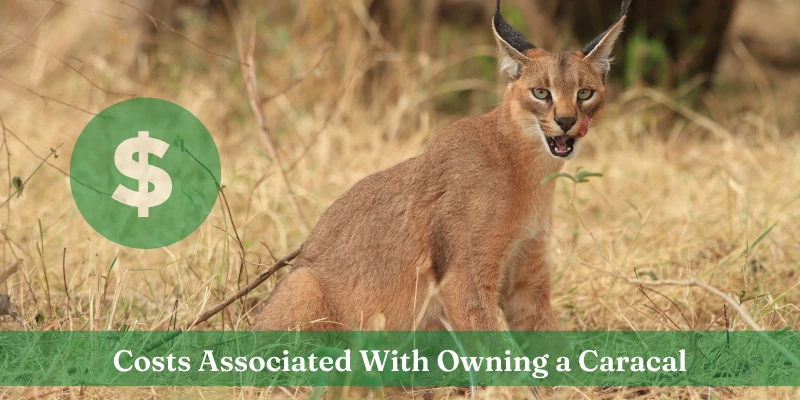
How Much Do Caracals Cost?
If it is legal to own a caracal where you live, expect to pay a good amount for your new pet.
The price range varies for many different reasons, but let’s take a look at what it will cost to purchase a caracal and then what to think about with ongoing costs associated with owning a pet caracal.
Pet Caracal – Initial Cost
If your state or local area allows you to purchase a caracal as a pet, you can expect to pay somewhere between $1,500 to $8,000 (USD) for your new exotic animal. This varies widely by availability, location, and age.
This estimate does not include any costs incurred for shipping, registration, or permits involved if required in your area for owning a pet caracal.
Pet Caracal – Ongoing Cost
The ongoing costs associated with owning a caracal as a pet will include budgeting for food (around $10 per day), shots and regular vet visits for checkups (cost varies), pet insurance (cost varies), and unforeseen issues that you nor I can even think of right now.
You should have money set aside just in case.
Where Can I Buy a Pet Caracal?
If you are serious about owning a caracal as a pet, you can check out some of these websites to get an idea of how much your new pet will accurately cost you.
As of right now, you can buy pet caracals, including adults and kittens, on these websites.
I can’t speak to how your experience will be if you decide to buy from any of these websites since I haven’t personally purchased from any of them.
I am just including them as a reference point of what you can expect to pay depending on where you are and any specifics you are looking for in a pet caracal – such as age and gender.
If you can’t own a caracal as a pet for whatever reason, you can symbolically adopt a caracal if you’d like to help rehabilitate one.
Click here if you are interested in reading more about adopting a caracal.
7 Commonly Asked Questions About Caracals
Below are 7 frequently asked questions (and answers) about caracals.
1. What Is the Lifespan of a Caracal?
The average lifespan of a caracal in the wild is between 10 to 12 years. The average lifespan of a pet caracal held in captivity is 16 to 18 years.
2. What Is the Life Cycle of a Caracal?
- Caracal Estrus: 1 – 6 days
- Caracal Gestation: 71 days
- Caracal Litter Size: 2 to 3 kittens (maximum of 6)
- Caracal Young Adult: 8 to 10 months
- Caracal Adult (sexual maturity): Around a year old
- Caracal Lifespan: 10 to 12 years in the wild, 16 to 18 years in captivity
3. Do Caracals Hiss when They Are Happy?
Caracals make many different sounds including hisses, growls, meows, spits, and purrs. Caracals hiss as a communication tool.
It doesn’t necessarily mean that they are tempered or angry. Sometimes, it may mean nothing.
Pet caracals seem to hiss at everything from humans to food, and sometimes for no reason at all.
It is just something they do.
4. What States Are Pet Caracals Legal?
Pet caracals are legal in many different states as exotic pets. These states include Arizona, Arkansas, Delaware, Florida, Indiana, Maine, Mississippi, Missouri, Montana, North & South Dakota, Oklahoma, Pennsylvania, and Texas.
5. How Big Do Caracals Get?
Adult caracals are 15 to 22 inches at the shoulder in height, 35 to 50 inches in length (including their tail – 8 to 12 inches), and can weigh between 20 (9 kg) to 40 pounds (18 kg).
6. Can Caracals Breed with Cats?
Yes, caracals can breed with cats but it is not a common occurrence due to most wild caracals having little to no encounters with cats.
Caracals are more likely to eat the cat than mate with it if they are hungry.
7. Are Caracals Dangerous Pets?
Caracals are dangerous pets if you have the wrong mindset and don’t prepare yourself for any and all possibilities of things that may happen while owning a pet caracal.
Again, they need to be properly trained and domesticated.
They need an open range to roam, a minimum of several acres would be ideal. You need to either live far away from neighbors and/or you need the proper security and fencing to contain your pet caracal.
Don’t ever assume that your pet will always behave in the manner you envision. Just take the necessary precautions and be prepared and everything should be fine.
Recap
There you have it! I crammed as much information as I could in this article to give you all the details you need to know about having a caracal as a pet.
In this article, I discussed where caracals are legal as pets, how much it costs to buy a pet caracal, and where you can look for one when researching purchase options.
I stated reasons that caracals would make good pets and why they wouldn’t make good pets, as well as some frequently asked questions about caracals.
I hope you enjoyed reading this article about pet caracals as much as I enjoyed writing it.
If you enjoyed this article, check out other exotic pets here.

